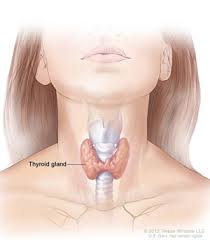 Jane came in to see me for acupuncture for pain in the neck and arms. After a few acupuncture sessions, her pain was only temporarily reduced. She also mentioned that she was more tired, bloated, constipated, and gradually gaining weight in the past year. Her menstrual period was also becoming heavier and irregular. I suspected hypothyroidism and decided to run some blood tests for her. And sure enough, her TSH was elevated and her thyroid peroxidase antibody (aka TPO antibody) was positive. I started her on thyroid treatment right away. All her symptoms improved. In fact the pain in the neck and arms resolved completely.
Jane came in to see me for acupuncture for pain in the neck and arms. After a few acupuncture sessions, her pain was only temporarily reduced. She also mentioned that she was more tired, bloated, constipated, and gradually gaining weight in the past year. Her menstrual period was also becoming heavier and irregular. I suspected hypothyroidism and decided to run some blood tests for her. And sure enough, her TSH was elevated and her thyroid peroxidase antibody (aka TPO antibody) was positive. I started her on thyroid treatment right away. All her symptoms improved. In fact the pain in the neck and arms resolved completely.
When Sam first came in to see me, she was not a happy person! She just had her annual wellness labs done and her family doctor congratulated her on her good health. She had always been living a healthy life style, with a good diet and regular exercises. And the wellness labs could attest to that, with normal blood sugar, cholesterols, vitamin D and thyroid function. However, she knew something was wrong with her, as she just wasn’t feeling like her normal happy self. She would get sleepy during the day, feel foggy in the brain, snap easily at her kids, and get sinus infection more often. I gave her a new lab order to assess iron status, vitamin B12, and thyroid antibodies. The results came back with thyroid peroxidase antibody (aka TPO antibody) being 20 times of normal upper limit, while iron and B12 were both within normal range.
Both Jane and Sam have the same autoimmune thyroid disease called Hashimoto thyroiditis, which is the most common cause of hypothyroidism, or low thyroid function, in the US. As thyroid hormones drive metabolism in every single cell in our body, you can imagine the wide impact of low thyroid function on all body systems and functions, including brain function, mood, digestion, nerves, immunity, and reproductive system. The point I want to make with the above two cases is that thyroid function test alone is not enough to detect a diseased thyroid. Jane’s TSH was higher than normal, which explained her symptoms and fit the diagnosis of hypothyroidism. Sam also had a lot of hypothyroid symptoms. But her TSH on her wellness labs was normal, therefore her family doctor didn’t suspect hypothyroidism. Hashimoto thyroiditis can cause hypothyroid symptoms even when thyroid function is still within normal range. “Within normal range” can sometimes be a questionable thing. In Sam’s case, there was actually another clue. When I compared her thyroid function and cholesterols with the previous years, I found that her thyroid function had declined and her cholesterols had gone up. This could be early laboratory signs of hypothyroidism and was what led me to do further testing.
Treating Hashimoto thyroiditis is one of the most rewarding experiences for a naturopath. Through dietary modification, nutritional supplementation, stress management, acupuncture, and in Jane’s case, thyroid medication, both Jane and Sam have seen huge improvement in their health. Their TPO antibodies have come down significantly, even became negative at times.
If Jane’s and Sam’s stories sound like what you have been experiencing, please give us a call at 480-388-0099 or schedule online so that we can help you the same we have helped many Janes and Sams.